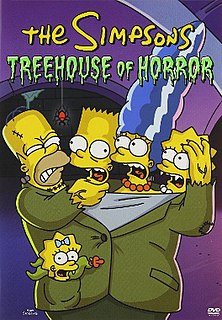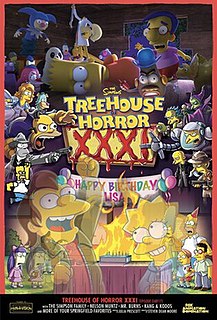Related Research Articles

"Fat Tony" D'Amico is the name of two recurring characters in the animated sitcom The Simpsons. Both are voiced by Joe Mantegna and first appeared in the episode "Bart the Murderer" of the third season. Fat Tony is a mobster and the underboss of the Springfield Mafia. His henchmen include Legs, Louie, and Johnny Tightlips, and he answers to Don Vittorio DiMaggio. Upon the death of the original Fat Tony in the episode "Donnie Fatso" of the twenty-second season, the character's near-identical cousin of the same name is introduced. The characters somewhat resemble real-life mobster Anthony "Fat Tony" Salerno.

Herschel Shmoikel Pinchas Yerucham Krustofsky, better known by his stage name Krusty the Clown, is a recurring character on the animated television series The Simpsons. He is voiced by Dan Castellaneta. He is the long-time clown host of Bart and Lisa's favorite TV show, a combination of kiddie variety television hijinks and cartoons including The Itchy & Scratchy Show. Krusty is often portrayed as a cynical, burnt-out, addiction-riddled smoker who is made miserable by show business but continues on anyway. He has become one of the most frequently occurring characters outside the main Simpson family and has been the focus of several episodes, many of which also feature Sideshow Bob.

Troy McClure is a fictional character in the American animated sitcom The Simpsons. He was originally voiced by Phil Hartman and first appeared in the second season episode "Homer vs. Lisa and the 8th Commandment." McClure is an actor who is usually shown doing low-level work, such as hosting infomercials and educational films. He appears as the main character in "A Fish Called Selma," in which he marries Selma Bouvier to aid his failing career and quash rumors about his personal life. McClure also "hosts" "The Simpsons 138th Episode Spectacular" and "The Simpsons Spin-Off Showcase."
The Mego Corporation is an American toy company that in its original iteration was first founded in 1954. Originally known as a purveyor of dime store toys, in 1971 the company shifted direction and became famous for producing licensed dolls, celebrity dolls, and the Micronauts toy line. For a time in the 1970s, their line of 8-inch-scale dolls with interchangeable bodies became the industry standard.

Dr. William MacDougal, better known as Groundskeeper Willie, is a recurring character on The Simpsons, voiced by Dan Castellaneta. He is the head groundskeeper and Janitor at Springfield Elementary School. Willie is almost feral in nature and is immensely proud of his Scottish origin. He is easily identifiable by his red hair and beard, as well as his aggressive temperament and thick, stereotypical Scottish accent.

Songs in the Key of Springfield is a soundtrack/novelty album from The Simpsons compiling many of the musical numbers from the series. The album was released in the United States on March 18, 1997, and in the United Kingdom in June 1997. This was the second album released in association with the Simpsons television series; however, the previous release, The Simpsons Sing the Blues, contained original recordings as opposed to songs featured in episodes of the series.

The Simpsons Movie is a 2007 American animated comedy film based on the long-running animated sitcom The Simpsons. The film was directed by David Silverman, and stars the regular television cast of Dan Castellaneta, Julie Kavner, Nancy Cartwright, Yeardley Smith, Hank Azaria, Harry Shearer, Tress MacNeille, Pamela Hayden, Russi Taylor, and Albert Brooks. The film follows Homer Simpson, who irresponsibly pollutes the lake in Springfield after the town has cleaned it up, causing the Environmental Protection Agency to imprison the town under a giant dome. After he and his family narrowly manage to escape, they ultimately abandon Homer for his selfishness and return to Springfield to prevent the town’s destruction by Russ Cargill, head of the EPA. Soon after his family leaves, Homer works to redeem his folly by returning to Springfield himself to help save the town and its citizens.

"Simple Simpson" is the nineteenth episode of The Simpsons' fifteenth season. It originally aired on the Fox network in the United States on May 2, 2004.
"Missionary: Impossible" is the fifteenth episode of the 11th season of The Simpsons. It originally aired on the Fox network in the United States on February 20, 2000. In the episode, Homer gets in trouble with PBS after confessing he does not have $10,000 to give them for their pledge drive, and ends up a missionary on a South Pacific island. It was directed by Steven Dean Moore and was the final episode written by Ron Hauge.
"It's a Mad, Mad, Mad, Mad Marge" is the twenty-first episode of The Simpsons' eleventh season. It first aired in the United States on the Fox network on May 14, 2000. After a failed marriage attempt with Otto, Becky stays with the Simpson family. However, Marge begins to get paranoid at her family's newfound love of Becky, and begins to think that she is seducing Homer.
"The Way We Was" is the twelfth episode of The Simpsons' second season. It originally aired on the Fox network in the United States on January 31, 1991. In the episode, Marge tells the story of how she and Homer first met and fell in love. Flashing back to 1974, it is shown how Homer falls in love with Marge in high school and tries to get close to her by enlisting her as his French tutor. After several hours of verb conjugation, Marge falls for Homer too, only to become enraged when he admits he is not a French student. Marge rejects Homer's invitation to the prom and goes with Artie Ziff. Artie turns out to be a terrible date and Marge realizes that it is Homer she really wants.
"Homer the Vigilante" is the eleventh episode of The Simpsons' fifth season. It originally aired on the Fox network in the United States on January 6, 1994. In the episode, a crime wave caused by an elusive cat burglar plagues Springfield. Lisa is distraught when her saxophone is stolen, and Homer promises to get it back. The police are ineffective, so Homer takes charge of a neighborhood watch. Under his leadership it becomes a vigilante group which fails to catch the burglar. With the help of Grampa, Homer discovers that the burglar is a charming senior named Molloy. Molloy is arrested, but he outwits the citizens of Springfield and escapes.

742 Evergreen Terrace is the street address most frequently attributed to the Simpson family home in the animated sitcom The Simpsons and in the feature film The Simpsons Movie. In the series, the house was originally owned by Homer and Marge Simpson, who live with their three children: Bart, Lisa, and Maggie. Later in the series the house was auctioned to Ned Flanders in "No Loan Again, Naturally" for $100 001, outbidding Montgomery Burns by one dollar, and since then leased to the Simpsons.
"Bart After Dark" is the fifth episode of The Simpsons' eighth season. It originally aired on the Fox network in the United States on November 24, 1996. After accidentally breaking a stone gargoyle at a local house, Bart is forced to work there as punishment. He assumes it will be boring work, but is surprised when he learns that it is actually a burlesque house. Marge is horrified when she learns of the burlesque house, and resolves to have it shut down. The episode was directed by Dominic Polcino and written by Richard Appel.

Treehouse of Horror, also known as The Simpsons Halloween Specials, is a series of Halloween-themed episodes of the animated sitcom The Simpsons, each consisting of three separate, self-contained segments. These segments usually involve the Simpson family in some horror, science fiction, or supernatural setting. They take place outside the show's normal continuity and completely abandon any pretense of being realistic, being known for their far more violent and much darker nature than an average Simpsons episode. The first, entitled "Treehouse of Horror", aired on October 25, 1990, as part of the second season and was inspired by EC Comics horror tales. Since then, there have been 30 other Treehouse of Horror episodes, with one airing every year.
Teenage Mutant Ninja Turtles action figures are toys based on the franchise of the same name and have been produced by the company Playmates Toys since 1988. Staff artists at the Northampton, Massachusetts based Mirage Studios have provided conceptual designs for many of the figures, vehicles, and playsets and are credited on the packaging of the products they created.
"Mad About the Toy" is the eleventh episode of the thirtieth season of the American animated sitcom The Simpsons, and the 650th episode overall. It aired in the United States on Fox on January 6, 2019.

"Treehouse of Horror XXXI" is the fourth episode of the thirty-second season of the American animated sitcom The Simpsons, and the 688th episode overall as well as the thirty-first "Treehouse of Horror" episode. It aired in the United States on Fox on November 1, 2020. The episode was directed by Steven Dean Moore, and written by Julia Prescott.
References
- 1 2 3 4 Taylor, Dan (November 12, 2004). "Simpsons fans line up for collectibles devoted to America's favorite nuclear family". Inside Collecting. Burlington County Times . p. 14.
- 1 2 3 4 5 Szadkowski, Joseph (May 2, 2002). "Hot new adventure of James Bond has license to thrill". Life - Science & Technology Tech Magic. Washington Times . p. B04.